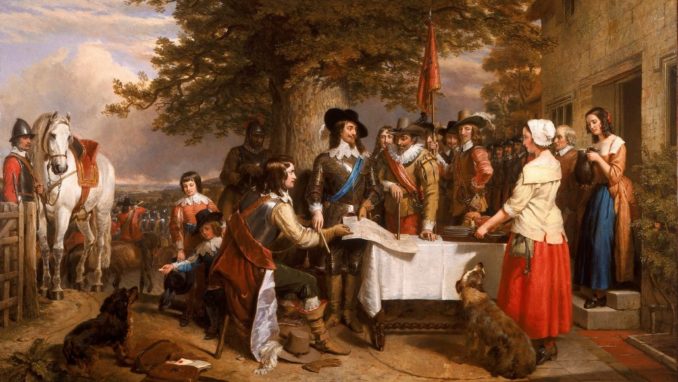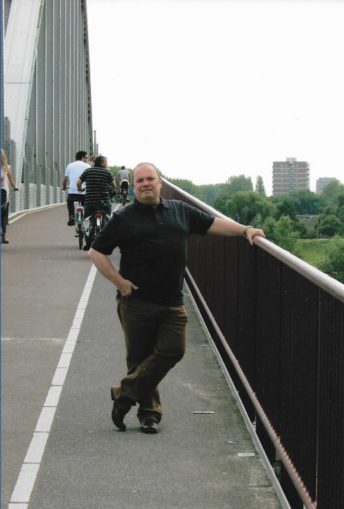
Walker Art Gallery, Public domain, via Wikimedia Commons
Edgehill was the first pitched battle of the English Civil War. It was fought near Edge Hill and Kineton in southern Warwickshire on Sunday, 23 October 1642. The soldiers of both sides were raw and their officers were inexperienced, apart from the few who had won their spurs in the European Wars of the early 17th Century. The Royalist dispositions were slightly uphill to the Parliamentarian forces, but the battle was indecisive and it had been a bloody affair. The fields were scattered with the dead and dying and it was a monumental task for such a rural and sparsely-populated country to deal with and bury the results of slaughter on such a scale.
As the simple country folk continued by day and night to bury the dead and prevent an outbreak of disease, they became aware that the battle was being continued through the hours of darkness.
“Between twelve and one of the clock in the morning was heard by some shepherds, and other country-men, and travellers, first the sound of drummers afar off, and the noise of soldiers, as it were, giving out their last groans; at which they were much amazed.
But then on the sudden, in that same air appeared those same incorporeal soldiers that made those clamours, and amazingly, with ensigns displayed, drums beating, muskets going off, cannons discharged, horses neighing, the alarm or entrance to this game of death was struck up”
The apparitions continued and during the following weeks, crowds of people would gather on the hillside to watch and listen to the spectral re-runs of the battle. The Establishment was disconcerted by these tales, fearing witchcraft, superstition and Papery was afoot in sleepy Warwickshire. The ramifications of this was an attempt to portray a moral message consenting the insurrection of Civil War with brother fighting brother.
“…the common Peace is like to be wholly destroyed, and this flourishing Kingdom in danger to perish under the miseries of a Civill War, if the Malice and Bage of these Persons be not instantly resisted : And as we do, and must relie on Almighty God (the Protector and Defender of his Anointed) to defend Us, and Our good People, against the Malice and Pernicious designes of these men”
Over time the apparitions became less frequent, but reports around the date of the battle continued well into the 20th Century. They became less violent in nature, more to do with sound such as the chinks of equipment, muted voices and the quiet whinnies of horses, as though they knew what the next day would have in store for them.
In October 1944, a Royal Air Force Acting Pilot Officer had finished basic aircrew training in Canada and his crew had just completed their Operational Training at RAF Edgehill, three miles southeast of Kineton. The Pilot Officer was the only officer in the bomber crew, the skipper was a Warrant Officer and the rest were sergeants. The airfield was on the escarpment overlooking the Vale of Kineton and this particular crew had reason to be especially thankful for its location. RAF Edgehill was an Operational Training Unit (OTU) where novice bomber crews would learn how to operate their aircraft before joining the Orbat of the front line squadrons.
OTU aircraft were inevitably clapped-out, hand-me-downs that had been retired from the front line. The Pilot Officer and his crew had been flying in a Wellington and during one take off, the port engine had cut out. The underpowered aircraft dropped like a fuel-laden brick and sank into the vale off the crest of the escarpment. The upward air currents hitting the hill probably helped. In any case, the pilot managed to restart the engine and the “Wimpy” rattled the windows and thatched roofs of Kineton as it clawed for altitude and speed.
The crew decided to celebrate their narrow escape and completion of their OTU tour by getting thoroughly pissed. The five of them (the air gunners would join the crew at the Heavy Conversion Unit), hit the pub in Kineton. The Pilot Officer drank more that he was used to and decided to walk back to the airfield to clear his head. He was my father and forty years later he told me the story in a pub (naturally), where we would often discuss the meanings of life, the universe, and everything.
“As I walked up the hill in the darkness, it was like I was walking through a vast camp site. I could feel the presence of thousands of men, some women and lots of horses. I stopped and listened, but didn’t hear anything. I know they were there and the hairs in the back of my neck bristled, with not fear but with gratitude. I almost felt like they had willed that bloody, knackered old Wimpy to stay in the air. And I said a prayer for them. They had fought their battle. I was soon going to fight the first of mine.”
I wondered if my dear old Dad was being serious. He was one of the most rational and analytic men that I had ever known. He was also very religious in the marvellously understated way people brought up in an earlier time had. Not preachy, just quietly self-assured in the Creed. Some of you may recall it: I believe in one God, the Father Almighty… He must have had some deeper resource to strap a Lancaster bomber onto his arse and in later years, Dakotas, Hastings and Canberras. He was being deadly serious.
© Blown Periphery 2017 2023

Christophe Downes 28th July 1957 – 30th March 2023



